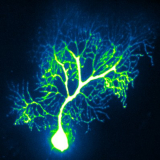
Contact information
Website: suvrathanlab.org
Email: aparna.suvrathan [at] mcgill.ca
Tel.: 514-934-1934 ext. 47140
Academic affiliations
Assistant Professor | Departments of Neurology & Neurosurgery, and Pediatrics
Junior Scientist | Brain Repair and Integrative Neuroscience (BRaIN) Research Program, Research Institute of the McGill University Health Centre
Publications
Research
One of the most fundamental functions of the brain is its ability to adapt during learning, yet there are many gaps in our understanding of how neurons and circuits are modified to encode a new memory. Research in the Suvrathan lab aims to bridge these gaps, by investigating the principles directing neuronal plasticity during learning - at the synaptic, cellular, circuit and behavioral levels.
The cerebellum provides an ideal system for addressing these questions because of its well-mapped cytoarchitecture and the ability to precisely measure and modify cerebellum-dependent motor behaviors.

There is considerable evidence indicating that the synaptic connections between neurons are capable of plastic changes, and that these changes play an important role in the processes of learning and memory. We are interested in deciphering how synaptic plasticity at synapses in the cerebellum, distributed across a neural circuit, can result in a specific and defined learned behavior. The Suvrathan lab investigates cerebellum-dependent learned behavior in a mouse model, by utilizing single-cell electrophysiology, molecular-genetic techniques, two-photon imaging, and detailed behavioral analyses.
More specifically, our research focuses on the following main areas:
- Our work has shown that the learning rules for synapses can be diverse, and that this diversity is precisely matched to the temporal and functional properties of the local circuit. Our research asks how synaptic specialization shapes circuit function, and challenges the assumption that a few basic rules determine how synapses encode learned behavior. We are interested in unraveling the molecular mechanisms underlying the diversity of temporal learning rules in the cerebellum.
- Cerebellar synapses are capable of many forms of plasticity. We build on current understanding of cerebellar synaptic plasticity to link defined plasticity mechanisms to specific aspects of motor learning. We do this using a combination of detailed behavior modification and measurement in rodents, whole-cell patch clamp recordings of synapses, and molecular techniques.
- Synaptic plasticity in the cerebellum is driven by errors. We link error-driven learning in the intact animal to the mechanisms of error-signal driven plasticity at inputs onto individual neurons.
- In addition to capitalizing on the extreme tractability and ease of measurement of motor behaviors, we are also interested in the role of the cerebellum in non-motor behaviors such as autism.